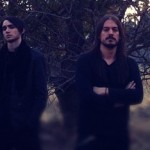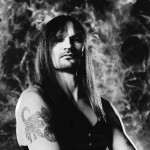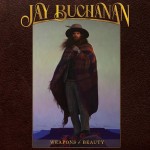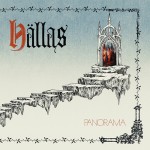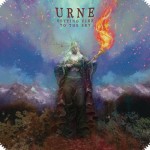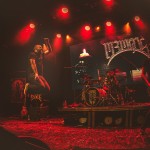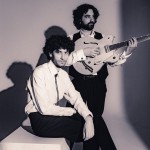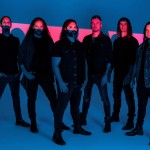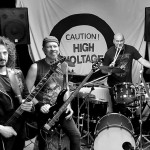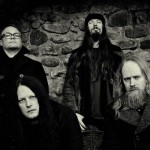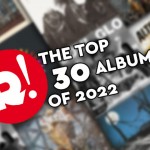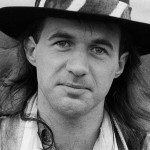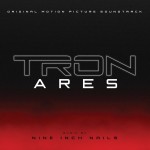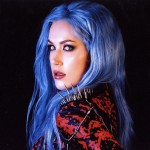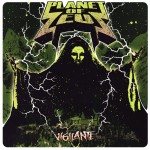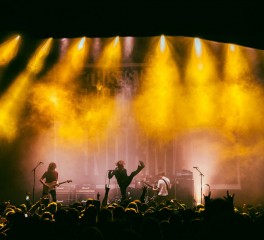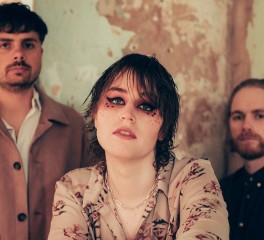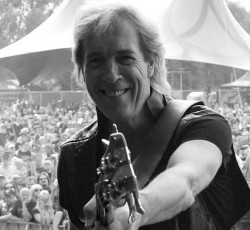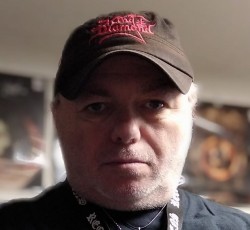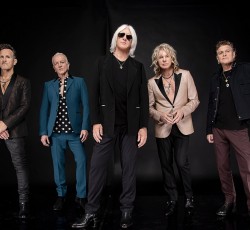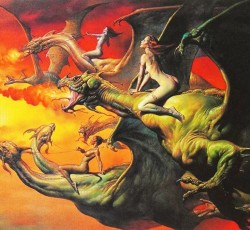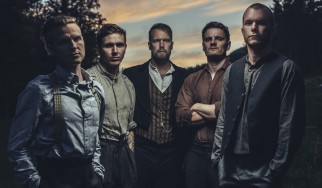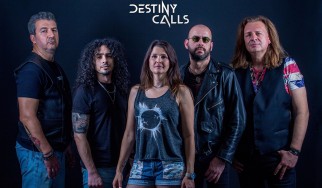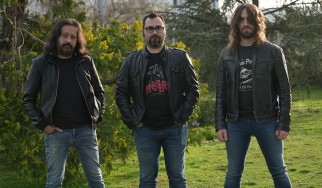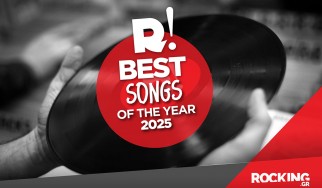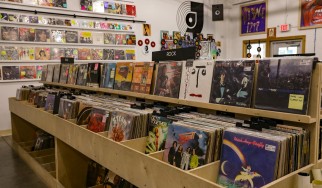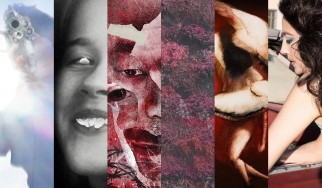Pupil Slicer: "A rebalance needs to happen in the music industry"
A discussion about people's expectations, the band's range, streaming platforms and drunk metalheads
Pupil Slicer are one of the most intriguing new bands to emerge from the contemporary -core scene. After making quite a lot of noise around their name already with their debut album a couple years back, with "Blossom" they make a statement; they do not want to play it safe or settle for anything. Instead, they turn their backs on all expectations and expand their sound as much as they possibly can. Ahead of their excellent Roadburn set, we had the sheer pleasure to sit down with Kate Davies and Luke Fabian (a connoisseur of the Hellenic power metal scene as it turns out, intro chat was off the record, so that's as far as we can go), to take a look behind the scenes of the new record and talk about indie beats, surviving Spotify and bin jousting.

How different was it making the new album compared to "Mirrors" and how different were you as persons while making it?
L: How different were as people making it? Wow, that's a big question.
K: It is.
L: I think, as a band we've grown tighter.
K: Definitely, as a unit.
L: As compatriots. In doing it there was a bit of creative and personal friction, but not like Guns N' Roses levels and things; like that's just natural, because I'm quite difficult to work with, and so is Kate. We're both quite head strong people, and then Josh (Andrews, drums) is quite good at arbitration, so this kind of happens a lot but yeah, I think because we've never recorded an album in a big studio, this was the biggest change. The process was an experience in of itself, like actually just doing it like that...
K: I mean the way we did the first one was probably not a normal way.
L: Oh no way. That was unconventional, the way we did that, and it took a lot out of Kate. You know, the actual process took a like three weeks or so...
K: It was a solid 28 days.
L: Yeah, so 28 days later we had a fucking banging album, but...
K: I had a fucking banging mental breakdown and I was just stuck in bed for like three months.
L: It's true. It literally took a toll on Kate.
K: But we got through in the end, and it was a good album for it. It was just a lot of work and then that on top of working my normal job, it was too much. But good end result, you know? [Laughs]
We picked "Blossom" as the first single just to fuck with people
So good! Back on the new stuff, how did you decide which songs to put out as singles?
K: Oh it was hard to decide on the singles. It's like there were a lot of songs that were really good I think, but by the nature of "The Song At Creation's End" being nine minutes long, it discounts it. Then, "Creating The Devil" was also like six minutes long, and it's really hard and we didn't want to have to play it like...
L: I was just going to say that. So one of the things that genuinely influenced the decision was like, whatever we picked, we'd actually got to play that first live.
K: And that song is amazing, but it was like 'not yet!'
L: Yes, I think 'yet' is the operative word there.
K: It's quite a tricky song, I remember the producer lost it when I was tracking guitars for it, he was like 'that's the longest anyone's ever taken to track guitars for one song here'.
L: Not a badge of honor though. [Both laugh] Back to your question about picking them, I think we picked "Blossom" as the first single just to fuck with people. Or maybe not to fuck with them, more like fuck with the expectations.
K: Exactly, so people wouldn't know what's coming next. And then "No Temple", we picked it specifically because it's heavy, maybe the heaviest on the record, you know we thought most people would hear "Blossom" and be like...
L: 'This band sucks! '
K: Yes! And then "Momentary Actuality" is going to be the third single, which is like a good all-rounder.
L: Yeah, it's a bit heavy, but it's got a melodic chorus, and it's like at the start of the album, which is cool. Actually, the singles were released in the reverse order that they appear in its run list on the album, does that make sense?

Indeed.
L: Indeed. That was... I mean, didn't you kind of consciously decide that? [To Kate]
K: Yeah, I also thought it was funny, like it leaves you at the start point and then you recontextualize the rest when the album comes out, you go in the opposite order.
You're using the indie beat, why would you do that?
So it's safe to assume that you weren't disappointed with the comments when the title track came out? You know there was a lot of people just questioning everything, like 'why are you like this?'
K: There were lots of whys around!
L: There's a really good friend of mine, really big fan of the band, he's a proper metalhead like me and when I played him "Blossom", the first thing that he said was 'why have you done this?' I was like 'what do you mean?' and he says 'you're using the indie beat, why would you do that?' Like, man, come on.
K: [Laughing]
L: And then his partner walked through, she's not a metalhead at all, and she went 'that's the best song I've ever heard you do'. [Laughing] I think that small interaction kind of represents why we kind of did that. We have range, we like listening to slamming death metal, but I like The Strokes as well. So if you can show your range, that's a good thing you know, and I think we wanted to show that to people. What did you think of that?
To be honest, for a moment I thought 'am I listening to the right track?'
L: Really?
Yeah, for like the first 30 seconds of it. But after that I was like 'why the hell not?'
K: Exactly!
L: It might sound a bit arrogant, coming from someone who's in the band, but I think like the musicality of it and the different performances on the instruments actually carry it. Often bands make like a song with clean vocals that got like a kind of indie beat, but more often than not, the instrumentation is bland as anything. It's just all about overproduction and it sucks whereas I think...
K: There's a bit more feel to "Blossom".
L: Yes, there's a lot more feel in the way that we're approached it. That's literally the hardest song, or one of the hardest songs, for me to play on bass. For Josh it's a bit more in the pocket, which is good for him. [Laughs] And then obviously the vocals are like this crazy soaring thing, and we just thought it'd be kind of like a big statement. And it's like funky and fun too, so why not?
K: Why the hell not!
Now, one of the things that got me thinking, was not how will it fit within the record, but more like how is it gonna fit a live set? You know, playing "Husk" and then this, it'd be a bit of a turn...
K: [At Luke] "Husk", there you go!
L: Well, it's... When we play, although obviously we take being in a band very seriously and like playing well very seriously, I don't think our persona is overly serious, like some metal bands and heavy bands present themselves. We're kind of like having fun and Kate is going mad and stuff, so I think in the context of that, it's like 'oh check this thing out!' And I think that's cool. It also helps that it has a nice pace, you know. [Claps rhythmically] But I think we're gonna bookmark it next to like a more chill number, one of the more post, blackgaze songs, like turn it down a bit and then bring out "Husk". [Laughs]
K: You always gotta bring it back, heavy at the start and in the end.
L: Yeah, heavier at the start and in the end and the middle is where you put the music.
K: Just a little music in the middle and noisy riffs before and after! [Laughs]
What's the point of buying a record if it's better to listen to on Spotify?
Talking off the middle, like you already talked a little bit about "The Song..." I'm gonna butcher it...
L: "The Song At Creation's End"!

A: Yes! It is just amazing and it really hit me because, a lot of the time those big songs are at the end of the records, so having that literally in the middle, felt like a twist. You know, it makes perfect sense right there and it just flows, if you get what I'm trying to say.
L: It helps as part of the narrative, yes.
K: It does. Also, we did put a long song at the end on the first album, so you're like 'well we can't do that every time'. [Laughs]
L: And we can't open with.
K: Hmm...
L: Well, yes, you could do something like that. That's close to what Slipknot did in their last album. They have a long, softer track in the start; don't know if you've heard it.
Can't remember what the song is called for the life of me, but I've heard it.
L: Me neither, but it is super cool. And yet at first listen even I was like 'alright what the fuck is this?' [Laughs] But then I came back and I was like 'oh that's actually quite clever'. You know, I just didn't really expect them to do that. Just another example of what we talked about earlier. Maybe next time we'll put the big one at the start.
K: I just I think it makes a good flow like you said, and I always think about it from like a record perspective. Like, that's the ending of side A of the record, and then you flip it over and play side B, and that's got its own sort of climax with "Blossom" at the end.
L: That's how bands in the 70s thought. You've got to start side B strong, right?
K: You've got to ensure that, otherwise what's the point of buying a record if it's better to listen to on Spotify?
The entire musician's profession is just gone
Now, since you brought up Spotify and you live the music industry from the inside, I just have to ask; what's your view on its current state?
K: I think it's a lot different than it used to be. I mean that's understandable, obviously. But now it's like a game. It's just very hard to make a band work at the moment. Like, we put so much work into this and we still don't get anything back out of it.
L: I mean we do, but...
K: We do, but in physical terms, this band cost us a lot of money, it takes up all our spirit, like you can't start this as a hobby and... it's just impossible. This has to be the thing you do with your free time and that's the only way to make a band. Maybe in the 80s or the 90s, you could be a band of our level and that was it...
L: That was your living.
K: Now it's like the entire musician's profession is just gone. All the intermediary things are hard work, and obviously being in a band is hard work, but you've got to do all the admin and the contracts and getting stuff done. I mean, there's still a fun part...
L: We include interviews in that! [Laughs]
K: [Laughs] I feel like the only actual jobs around music that you can make a living on are actually music-adjacent, like doing PR or making the merchandise and stuff. And even those are like...
L: Fringe.
K: Yeah, and they are also very hard to make work, they're also like dying off. It just sucks.
When Tool joined the streaming platforms, the last bastion in rock and metal had fallen
L: To your direct question, I fucking hate streaming shit. I mean, I use it myself, but I also buy lots of records.
K: The convenience of it is really good.
L: It really is, but it makes people flat-headed because it's like... instead of having like ten albums you've got like every album, ever. Maybe that's just me, cause I'm terrible at choosing.
K: I agree. I find it hard to go back to and listen to an album over and over on Spotify, whereas if I I download it on my phone, I'll look at what's in there and I can just get more out of it, if that makes any sense.
L: A rebalance needs to happen in the music industry.
K: I'm not really sure about that. Did you see that Spotify is trying and make artists give up more of their cut, so that they can get better algorithm placement in that like TikTok-ified vertical scrolling new interface?
L: Fucking Spotify! It's like they're running analytics and KPIs on music and it's just fucking... It's like gambit democracy. It's like do you want to do you want to be in the game? If you do, you have to do this and if you don't, then you can't play the game; unless you're huge and can release shit on your own label. There's no way around it. When Tool joined the streaming platforms, the last bastion in rock and metal had fallen. They weren't on them for like ten years or something, they were one of the only major bands I can think of to do that. And then I imagine, if you looked at their album sales, they would have still been good, because they are Tool and people still need the product, so... But we don't quite have that sway, you know.
K: Not yet. [Laughs]
L: [Laughs] Well, we're gonna do a Prince and in like fifteen years just pull all of our music from there.

[Laughs] And then there's also Bandcamp.
L: I feel very differently about Bandcamp. It's a lot better, for merchandise not so much, but for the music part it's really good, and it reflects more of what a meritocracy you could have in digital music distribution.
K: Like, Spotify's got playlists and stuff but not in the same way as Bandcamp has those shining-a-spotlights on all these upcoming artists and doing all these features...
L: With Spotify it's just analytics and numbers, isn't it?
K: It's pure performance.
L: Well, that was quite a long one. More of a rampage than an answer, actually. [Laughs]
A good one though! Pretty sure we are out of time too, to be honest.
L: Ah, come on, let's do one more.
One about Roadburn, then.
L: Who we're looking forward to seeing?
Not quite. So, I know that you are playing Download this summer, but I'm not really sure if you have played any other festival that big...
L: Well, we played Brutal Assault in Czech Republic, or Czechia...
K: And we did Bloodstock.
Because drunk metalheads!
That is a big one, definitely! Now, you haven't played here yet, but you've got the vibes, so my question is how different does Roadburn feel as a whole to those big metal fests?
L: I mean there's no bin jousting here.
K: [Laughs]
Wait, what?
K: [Laughs loudly]
L: You know jousting, the medieval horse-lance-fighting thing? Well, in a Bloodstock they do it with bins among the campsites.
Oh dear. Why?
L: Because drunk metalheads! [Laughs]
There are drunk metalheads here, too! [Laughs]
K: Oh no! [Laughs]
L: No, no, it's completely different here! This is very refined and curated, very intellectual.
K: These here are the sort of bands you watch and you're like 'oh that was very clever', or 'oh that was nice!' It's not like [deep voice] 'get in the fucking pit!' and dun-dun-dun-dun-aaargh! [Screams while laughing]
L: Bloodstock is a bit more loudish, this is a lot more I would say poised. I'm talking based on the names though, I haven't managed to watch any bands yet.
K: I saw Deafheaven last night!
A: They were amazing!
K: They were, and I wanted to see Bell Witch today, but...
A: They're playing right now, aren't they?
K: Yup.

A: And what about Download? I believe that compared to Bloodstock it's a little bit more... [Interview time is officially over]
K: It's a bit more mainstream.
L: And a bit less metal, I'd say. Well, metal is there, but it's more alternative generally.
K: In my opinion, we're more of a Download band than a Bloodstock band. I thought we wouldn't be heavy enough for Bloodstock, like they're more into metal and we're a bit closer to hardcore...
L: In fairness to Bloodstock, in the last like four or five years they have introduced a lot more hardcore and they've expanded it beyond being like Saxon every year.
K: Saxon, Arch Enemy and stuff like that. And I like some of those bands, but we don't sound like any of them. And that was why I was kind of worried, but it ended up being really good so I'm quite positive about Download as well. We're playing on the day with Bring Me The Horizon...
L: And Converge, I think we'll play on the same stage.
A: Oh, that'll be nice!
L: And we'll get to see Metallica!
A: Please, give them my best!
L: We will! [Laughs]

